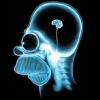I've continued to take LDN nearly every night since my last post in September (for a chronic inflammatory condition). I now take tianeptine on and off, for when I feel I need to be in a relaxed but sharp state, for example when giving a presentation or conducting a class.
What I found combining these two was that the LDN did seem to cancel out any tolerance to the opioid-like effects of tianeptine, but it also means that, if I try to dose tianeptine (sodium) at 3 x 10mg per day, it's far too easy to get into some kind of over-stimulated state where you can't think straight. It's a kind of brain fog combined with a paradoxical kind of "happy anxiety". That's the best I can do to describe the effect on me. I also get dry, itchy eyes and in the worst case, sometimes red itchy eyes on this combination if I try to dose it for more than a few days at a time. This means that I've had to stop using tianeptine daily, and reserve it for special cases where stress might otherwise be debilitating. I try not to take it more than twice a day (i.e. no more than two 10mg pills), and no more than two days in a row. I have to leave at least one day's gap between days on, though more is better.
I should add the caveat that my body seems quite bad at clearing psychoactive substances from my bloodstream, or from my brain. I seem to need much lower doses than those recommended for almost all nootropics of the racetam family, and I can't take piracetam at all without feeling horribly drained. Noopept, pramiracetam and oxiracetam are fine, in small doses, but they build up far too fast for me until they have paradoxical effects.
Ah, one more thing. I've found taking a small dose of noopept (about 4mg) before, or at the same time, as a tianeptine pill seems to attenuate or smooth out the euphoric effects which can often be unwanted (for example, if you want to concentrate on an intellectual task). It also seems to make tianeptine just "smoother" and subtler overall for me (a good thing). Maybe it competes with tianeptine by occupying or regulating the AMPA-glycine receptor? However, noopept doesn't allow me to take tianeptine regularly alongside LDN -- I still get the side effects mentioned. It's not really an option for me to stop LDN, as whenever I've tried to do so for more than two days, my chronic inflammation comes galloping back.


















































